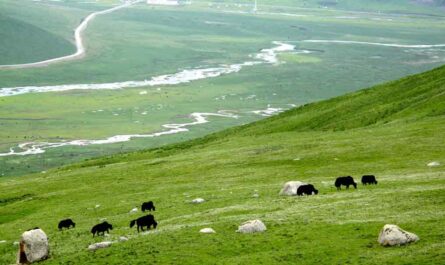What are some of the interesting facts about Djibouti? Despite its small size, Djibouti plays an outsized role in global affairs, hosting military bases from countries such as the United States, France, and China, due to its strategic location. This has brought both economic benefits and challenges, influencing Djibouti’s development trajectory. The capital city, Djibouti City, buzzes with activity, blending modern infrastructure with historical architecture, like the elegant Hamoudi Mosque and the lively markets offering spices, textiles, and handicrafts. In this article, I will talk about some interesting facts about Djibouti. Keep reading.
As Djibouti charts its course into the 21st century, it grapples with issues of sustainability, economic diversification, and social development, aiming to harness its strategic advantages while preserving its rich cultural heritage. As such, Djibouti remains an intriguing destination for adventurers and scholars alike, offering a glimpse into a nation balancing tradition and modernity on the edge of Africa’s gateway to the world.
Interesting Facts About Djibouti: History, Culture, Travel
Djibouti, nestled in the Horn of Africa, is a nation of captivating contrasts and strategic significance. Bordered by Eritrea, Ethiopia, and Somalia, and overlooking the Bab-el-Mandeb Strait connecting the Red Sea to the Gulf of Aden, Djibouti holds a pivotal geopolitical position. Its landscape is dominated by rugged mountains and vast deserts, where temperatures soar amidst a backdrop of stunning natural beauty. The country’s culture is a vibrant mosaic of Somali, Afar, and Arab influences, reflected in its traditions, languages, and cuisine. Here are some interesting facts about Djibouti:
1. Strategic Location: Djibouti’s Geopolitical Significance
Djibouti, strategically positioned at the junction of the Red Sea and the Gulf of Aden, holds immense geopolitical importance due to its maritime location. Serving as a gateway between Africa and the Arabian Peninsula, Djibouti’s ports are vital transit points for international trade and maritime traffic navigating the Suez Canal. Its proximity to major shipping lanes connecting Europe, Asia, and the Middle East makes Djibouti a crucial hub for global commerce and naval operations.
Moreover, Djibouti hosts military bases leased to several foreign powers, including the United States, France, China, and Japan, underscoring its role in regional security and stability. As a key player in regional diplomacy and logistics, Djibouti plays a pivotal role in shaping economic development and security initiatives across the Horn of Africa, enhancing its stature as a strategic linchpin in the global maritime landscape.
2. Land of Contrasts: Djibouti’s Diverse Landscapes
Djibouti’s landscape is a testament to its geological diversity, showcasing a dramatic array of natural features that captivate and astonish. From rugged volcanic mountains like the Goda and Mousa Ali ranges to expansive salt flats and coral reefs along its coastlines, Djibouti offers a visual tapestry unlike any other. The highlight is the Danakil Depression, one of the hottest places on Earth, where temperatures soar amid sulfur springs and lava lakes, contrasting sharply with the cool waters of the Gulf of Tadjoura and the vibrant marine life in the Bab el Mandeb strait. This juxtaposition of extremes creates a unique habitat for wildlife and a captivating playground for adventurous travelers seeking to explore the stark beauty and geological wonders of Djibouti’s natural landscapes.
3. Lake Assal: Africa’s Salty Marvel
Lake Assal, nestled in Djibouti’s Danakil Desert, stands as Africa’s lowest point and one of the saltiest bodies of water globally, second only to Antarctica’s hypersaline lakes. Formed within a volcanic crater, Lake Assal’s turquoise waters and stark white salt crusts create a surreal landscape that contrasts vividly against the arid desert surroundings. Its high salinity levels have shaped unique ecosystems adapted to extreme conditions, attracting researchers and eco-tourists intrigued by its scientific and natural significance. As a geological marvel and UNESCO World Heritage Site, Lake Assal symbolizes Djibouti’s natural wealth and environmental resilience, offering a glimpse into Earth’s ancient past and the ongoing forces that shape our planet’s diverse landscapes.
4. Djibouti City: Vibrant Cultural Hub
Djibouti City, the cosmopolitan capital of Djibouti, pulsates with a blend of historical charm and modern vitality. Influenced by its French colonial heritage, the cityscape melds elegant colonial architecture with bustling markets, vibrant street life, and a thriving port that serves as a gateway to the Horn of Africa. From the historic Place Mahamoud-Harbi to the bustling markets of Les Caisses, Djibouti City offers a sensory journey through its diverse cultural influences, where Arabic, Somali, Afar, and French traditions converge.
As the political, economic, and cultural heart of Djibouti, the city reflects the nation’s dynamic identity and serves as a meeting point for people from across the region, fostering cross-cultural exchanges and economic opportunities amidst a backdrop of coastal charm and urban energy.
5. Volcanic Activity: Nature’s Fiery Spectacle
Djibouti’s landscape bears witness to dynamic volcanic activity, with several volcanoes punctuating its terrain and offering a glimpse into Earth’s fiery forces. Among these, Erta Ale stands out as a majestic shield volcano known for its persistent lava lake, creating a mesmerizing spectacle of molten rock against the night sky. The region’s volcanic activity has shaped Djibouti’s geology over millennia, influencing its topography and providing fertile ground for diverse ecosystems to flourish amid the harsh desert environment. For adventurers and geologists alike, Djibouti’s volcanic landscapes offer a captivating study of Earth’s geological processes and a reminder of the powerful natural forces that continue to shape our planet’s surface.
6. The Afar Triangle: Geological Marvel at Earth’s Crossroads
The Afar Triangle, where the African, Arabian, and Somali tectonic plates converge, represents a geological marvel of global significance. This tectonic intersection manifests in dramatic rift valleys, volcanic eruptions, and hydrothermal vents that dot the landscape, creating a mosaic of geological wonders unparalleled in their diversity and complexity.
The Afar region’s unique geological features, including the Danakil Depression and the salt flats of Assal, provide valuable insights into Earth’s geological evolution and the ongoing processes of continental drift. Beyond its scientific importance, the Afar Triangle captivates visitors with its stark beauty and otherworldly landscapes, offering a glimpse into the Earth’s primordial forces and the intricate interplay between geology, climate, and life on our planet.
7. Djibouti’s Independence: A New Era
Djibouti’s independence from France in 1977 marked a significant milestone in its history, paving the way for self-governance and a renewed sense of national identity. After decades under French colonial rule, Djibouti’s quest for independence was fueled by aspirations for autonomy, cultural preservation, and economic development. The declaration of independence on June 27, 1977, heralded a new era of sovereignty and political stability, although challenges such as economic diversification and social cohesion persisted. Today, Djibouti commemorates its independence annually, celebrating its journey towards self-determination and affirming its place in the global community as a sovereign nation in the Horn of Africa.
8. Somali and Afar Ethnicities: Rich Cultural Diversity
Djibouti’s population is predominantly composed of Somali and Afar ethnic groups, each contributing unique cultural traditions, languages, and historical narratives to the nation’s diverse tapestry. The Somali people, hailing from Djibouti’s southern regions and neighboring Somalia, are known for their nomadic heritage, camel husbandry, and intricate oral traditions.
In contrast, the Afar people, primarily inhabiting Djibouti’s northern regions and parts of Ethiopia and Eritrea, are renowned for their resilience in harsh desert environments, skilled craftsmanship, and distinct linguistic heritage. Despite their differences, both Somali and Afar communities share a deep connection to Djibouti’s land and sea, preserving centuries-old customs through ceremonies, storytelling, and cultural festivities that celebrate their enduring identities.
9. French Colonial Influence: Legacy and Modernity
French colonial influence remains palpable in Djibouti’s architecture, language, and cultural norms, underscoring a historical legacy that has shaped the nation’s modern identity. As a former French territory, Djibouti adopted French as an official language alongside Arabic and Somali, facilitating communication in government, education, and business sectors.
Architecturally, French colonial buildings dot Djibouti City’s landscape, blending with contemporary structures to create a unique urban aesthetic that reflects a fusion of European and African influences. Beyond language and architecture, French cultural elements such as cuisine, fashion, and educational systems continue to resonate within Djiboutian society, showcasing a harmonious coexistence of traditional values and global perspectives nurtured by decades of colonial history.
10. Strategic Military Base: Global Security Hub
Djibouti’s strategic location at the crossroads of Africa, the Middle East, and Asia has positioned it as a vital hub for international military operations and security alliances. Hosting military bases from countries such as the United States, France, China, and Japan, Djibouti plays a pivotal role in safeguarding global maritime trade routes, combating piracy in the Gulf of Aden, and supporting regional stability initiatives.
The presence of foreign military installations underscores Djibouti’s geopolitical significance as a linchpin for multinational cooperation, intelligence-sharing, and rapid response capabilities in combating transnational threats. Beyond military functions, these partnerships contribute to Djibouti’s economic growth through infrastructure development, job creation, and technology transfer, reinforcing its role as a critical nexus in maintaining peace and security across the Horn of Africa and beyond.
11. Gateway to the Red Sea: Economic Lifeline
The port of Djibouti stands as a vital gateway for international trade and shipping traffic, linking the Red Sea with the Indian Ocean and beyond. Strategically located along major maritime routes connecting Europe, Asia, and Africa, Djibouti’s ports facilitate the transshipment of goods, commodities, and humanitarian aid to landlocked countries in East Africa, enhancing regional trade dynamics and economic integration.
With state-of-the-art container terminals and logistical infrastructure, the port of Djibouti serves as a linchpin for global supply chains, attracting investment from multinational corporations and bolstering Djibouti’s role as a premier logistics hub in the Horn of Africa. As a cornerstone of Djibouti’s economy, the port sector contributes significantly to national revenue generation, employment opportunities, and sustainable development initiatives, underscoring its pivotal role in shaping Djibouti’s economic landscape and fostering international connectivity.
12. The Importance of Camels: Symbol of Resilience and Utility
Camels hold a profound cultural and practical significance in Djiboutian society, embodying resilience, adaptability, and traditional livelihoods across generations. Revered for their ability to thrive in Djibouti’s arid and semi-arid landscapes, camels serve as indispensable assets for transportation, carrying goods and people across vast desert terrains that modern vehicles may struggle to traverse.
Beyond their role in mobility, camels provide a vital source of milk and meat for sustenance, offering nutritional benefits in a region where agricultural resources are scarce. Symbolically, camels symbolize endurance and cultural heritage, featuring prominently in folklore, ceremonies, and artistic expressions that celebrate Djibouti’s pastoral traditions and nomadic way of life. As symbols of resilience in the face of environmental challenges, camels embody Djibouti’s enduring spirit and cultural resilience, bridging ancient traditions with contemporary realities in the Horn of Africa.
13. Djiboutian Cuisine: A Fusion of Flavors
Djiboutian cuisine is a delightful fusion of Somali, Afar, and Yemeni culinary traditions, reflecting the nation’s cultural diversity and coastal influences. Staple foods include fragrant rice dishes, hearty meat stews seasoned with aromatic spices like cumin and coriander, and fresh seafood sourced from the Red Sea and Gulf of Aden. Grilled meats, particularly goat and camel, are popular delicacies, often enjoyed with flatbreads or couscous. Spicy sauces and condiments made from chili peppers and herbs add depth to many dishes, creating a rich tapestry of flavors that tantalize the palate. Djiboutian cuisine not only satisfies hunger but also serves as a celebration of heritage, community gatherings, and the vibrant culinary arts cherished by its people.
14. Salt Production: Sustaining Tradition
Salt production along Djibouti’s coastal regions has been a traditional livelihood for local communities for centuries. Harvested from salt flats and evaporation ponds, salt remains a valuable commodity essential for preserving food, seasoning dishes, and supporting local economies. The process involves collecting seawater in shallow ponds where it evaporates under the scorching sun, leaving behind crystallized salt deposits that are harvested by hand. This age-old practice not only sustains livelihoods but also preserves cultural traditions passed down through generations, showcasing Djibouti’s reliance on natural resources and its commitment to maintaining sustainable practices in salt production.

15. The Importance of Coffee in Djiboutian Culture
Coffee holds a significant place in Djiboutian culture, serving not only as a beloved beverage but also as a symbol of hospitality and social connection. The traditional coffee ceremony, known as “bun,” is a cherished ritual where freshly roasted coffee beans are ground, brewed, and served in small cups to guests. This ceremony, often performed by women in the household, fosters community bonds and provides a time for relaxation and conversation. Djiboutians take pride in their coffee, which is typically strong and aromatic, enjoyed throughout the day in homes, cafes, and social gatherings. The tradition of coffee in Djibouti underscores its cultural richness and the importance of shared experiences in daily life.
16. Khat Chewing: A Social Practice with Controversy
Khat chewing is a prevalent social practice in Djibouti, particularly among men, despite growing concerns over its health implications. Khat, a flowering plant native to East Africa and the Arabian Peninsula, contains stimulant compounds that produce mild euphoria and increased alertness when chewed. While khat chewing is legal and deeply rooted in cultural customs, prolonged use has been associated with various health issues, including addiction, cardiovascular problems, and mental health challenges. Despite these concerns, khat remains a significant aspect of social interaction in Djibouti, where it is consumed during gatherings, discussions, and informal meetings, reflecting social norms and traditions unique to the region.
17. The Dabdab Depression: A Unique Ecosystem
The Dabdab Depression, located in Djibouti’s interior, stands as another remarkable point of low elevation renowned for its distinctive ecosystem and extreme temperatures. This geological depression, marked by salt flats and rocky terrain, represents one of the lowest points in Africa and showcases the harsh yet fascinating conditions of Djibouti’s arid landscapes. Despite its challenging environment, the Dabdab Depression supports a unique array of flora and fauna adapted to its saline soils and extreme heat, contributing to the region’s biodiversity and scientific interest. Visitors to the Dabdab Depression are captivated by its stark beauty and geological significance, offering a glimpse into Earth’s natural processes and adaptation strategies of life in extreme environments.
18. Whale Shark Sightings: Majestic Encounters in Djibouti’s Waters
Lucky visitors to Djibouti may have the extraordinary opportunity to encounter whale sharks, the largest fish species, in the waters off its coast. Known for their immense size and gentle nature, whale sharks frequent Djibouti’s warm, nutrient-rich waters as part of their migratory patterns. These magnificent creatures, characterized by their distinctive spotted patterns and enormous mouths, attract marine enthusiasts and researchers alike seeking to observe and study them in their natural habitat. Encounters with whale sharks in Djibouti offer a thrilling and awe-inspiring experience, contributing to the country’s reputation as a premier destination for marine ecotourism and conservation efforts.
19. The National Park System: Protecting Djibouti’s Unique Ecosystems
Djibouti is in the process of establishing a national park system aimed at conserving its diverse and unique ecosystems. This initiative seeks to protect the country’s natural heritage, including its volcanic landscapes, salt flats, coral reefs, and endemic wildlife. National parks in Djibouti are envisioned as sanctuaries where flora and fauna can thrive undisturbed, offering opportunities for ecological research, environmental education, and sustainable tourism. By safeguarding these critical habitats, Djibouti aims to promote biodiversity conservation, mitigate the impacts of climate change, and preserve its natural beauty for future generations to enjoy and appreciate.
20. Economic Development Efforts: Focusing on Trade, Tourism, and Foreign Investment
Djibouti is actively pursuing economic development strategies centered around trade, tourism, and foreign investment. Situated at the strategic crossroads of global shipping routes, Djibouti leverages its geostrategic location to enhance its role as a key hub for international trade and logistics. The country has invested significantly in modernizing and expanding its port infrastructure, including the Doraleh Container Terminal and the Doraleh Multipurpose Port, to accommodate growing maritime traffic and transshipment activities. These developments aim to position Djibouti as a gateway for trade between Africa, Asia, and Europe, fostering economic growth and job creation.
In addition to trade, Djibouti recognizes the potential of tourism as a driver of economic diversification and development. The country’s unique landscapes, including volcanic formations, salt lakes, and pristine coastlines along the Red Sea, attract adventure seekers, eco-tourists, and cultural enthusiasts. Efforts to enhance tourism infrastructure and promote Djibouti’s natural and cultural attractions aim to capitalize on its appeal as a destination for international travelers seeking authentic experiences.
Moreover, Djibouti actively seeks foreign investment across various sectors, including energy, telecommunications, and infrastructure. The government has implemented investor-friendly policies and initiatives to attract multinational corporations and private investors interested in establishing operations or partnerships in Djibouti. Strategic collaborations and partnerships with international development agencies and financial institutions further support Djibouti’s economic diversification efforts, aiming to reduce dependence on traditional sectors and stimulate sustainable growth.
21. Festivals and Celebrations: Showcasing Djibouti’s Cultural Heritage
Throughout the year, Djibouti celebrates a variety of festivals that highlight its rich cultural heritage and traditions. These vibrant celebrations bring together communities from different ethnic backgrounds, showcasing music, dance, cuisine, and traditional arts. Festivals in Djibouti serve as occasions for social cohesion, where locals and visitors alike gather to participate in cultural performances, parades, and religious ceremonies. Key festivals include religious holidays such as Eid al-Fitr and Eid al-Adha, as well as national events commemorating independence and unity. Through these festivals, Djibouti proudly displays its cultural diversity and historical significance, fostering a sense of pride and identity among its people.
22. Limited Arable Land: Agricultural Challenges in Djibouti
Djibouti faces significant challenges in agriculture due to its arid climate and limited arable land. The country’s predominantly desert and semi-desert environment restricts the cultivation of crops, relying heavily on imported food supplies to meet domestic demand. Water scarcity exacerbates agricultural constraints, requiring innovative irrigation techniques and sustainable farming practices to support crop production in limited oasis areas.
Despite these challenges, Djibouti explores alternative agricultural methods such as hydroponics and greenhouse farming to enhance food security and reduce dependence on imports. Addressing the issue of limited arable land remains a priority for Djibouti’s agricultural sector, balancing sustainability with the need to feed its population amidst climatic and environmental pressures.
23. The Goubet Rift: Adventure in Djibouti’s Canyon System
The Goubet Rift, a dramatic canyon system located along Djibouti’s coastline, beckons adventurers and explorers with its rugged terrain and scenic vistas. Formed by tectonic movements and volcanic activity, the Goubet Rift offers opportunities for hiking, rock climbing, and exploration of its ancient geological formations. The canyon’s steep walls and deep gorges provide a habitat for diverse wildlife and plant species adapted to its arid conditions, adding to its allure as a natural sanctuary for outdoor enthusiasts. The Goubet Rift stands as a testament to Djibouti’s geological diversity and offers visitors a thrilling escape into its untamed landscapes and rich natural heritage.
24. The Need for Sustainable Practices: Preserving Djibouti’s Fragile Environment
Sustainable practices are imperative for Djibouti to safeguard its fragile environment and ensure long-term prosperity. The country’s arid climate and limited freshwater resources necessitate careful management and conservation efforts to mitigate environmental degradation and promote ecological resilience. Sustainable practices in agriculture, water management, and energy production are critical to reducing carbon emissions, conserving natural resources, and adapting to climate change impacts.
Djibouti is increasingly investing in renewable energy initiatives, such as solar and wind power projects, to diversify its energy mix and reduce reliance on imported fossil fuels. These efforts align with global sustainability goals and contribute to Djibouti’s commitment to environmental stewardship and sustainable development.
Furthermore, sustainable tourism practices are vital for minimizing the ecological footprint of visitors while maximizing the socio-economic benefits for local communities. Initiatives focusing on wildlife conservation, waste management, and eco-friendly tourism operations promote responsible travel practices and preserve Djibouti’s biodiversity and natural habitats.
25. Scuba Diving Paradise: Exploring Djibouti’s Red Sea Coast
Djibouti’s Red Sea coast is celebrated among scuba diving enthusiasts for its vibrant coral reefs, crystal-clear waters, and diverse marine life. The underwater world off Djibouti’s shores teems with colorful fish, dolphins, turtles, and even whale sharks, offering unparalleled opportunities for underwater exploration and photography. The coral reefs, largely untouched and thriving in the Red Sea’s nutrient-rich waters, provide a habitat for an array of marine species and serve as a crucial ecosystem for Djibouti’s coastal biodiversity. Scuba divers flock to Djibouti to witness its underwater wonders, where encounters with rare marine creatures and pristine coral gardens create unforgettable experiences in this aquatic paradise.
26. Lake Abbe: Mystical “Smoking Chimneys”
Lake Abbe, nestled in Djibouti’s desolate landscape near the Ethiopian border, is renowned for its surreal and otherworldly “smoking chimneys.” These towering limestone chimneys, spewing hot sulfuric gases into the air, create a mesmerizing spectacle that contrasts sharply against the barren salt flats and volcanic terrain surrounding the lake. Formed by geothermal activity and the convergence of tectonic plates, Lake Abbe’s smoking chimneys are a testament to the Earth’s geological forces and offer a unique glimpse into nature’s raw power and beauty. Visitors to Lake Abbe are captivated by its eerie atmosphere and the ethereal allure of these natural formations, making it a must-see destination for explorers and nature enthusiasts alike.
28. The Hanable Plain: A Surreal Desert Canvas
The Hanable Plain, located in Djibouti’s interior, presents a surreal and captivating landscape characterized by vast expanses of white rock formations sculpted by wind and time. This otherworldly terrain, resembling a lunar landscape, is devoid of vegetation and stretches as far as the eye can see, punctuated only by the occasional nomadic encampment or camel caravan.
The stark beauty of the Hanable Plain lies in its simplicity and stark contrasts, offering photographers and adventurers a canvas of natural artistry that challenges perceptions of Earth’s landscapes. As one of Djibouti’s hidden gems, the Hanable Plain beckons travelers seeking solitude, inspiration, and a deeper connection to the planet’s ancient geological history.
29. Endangered Wildlife: Conservation Challenges
Djibouti’s diverse ecosystems provide critical habitats for endangered wildlife species such as the beira antelope and the Dorcas gazelle. These iconic animals face significant threats from habitat loss due to human encroachment, overgrazing by livestock, and illegal poaching for their meat and horns. Conservation efforts led by local authorities and international organizations aim to protect these vulnerable species through habitat restoration, anti-poaching initiatives, and community education programs.
By raising awareness about the importance of biodiversity conservation and sustainable land management practices, Djibouti strives to safeguard its natural heritage for future generations and promote harmony between wildlife and human activities in its unique ecological landscapes. RPM 3.0 – 60% CONVERSION & Money for Affiliate Marketing
30. The Arta Great Mosque: Architectural Heritage
The Arta Great Mosque, an architectural gem built in the 19th century, stands as a prominent landmark in Djibouti, showcasing unique Islamic architectural styles and cultural heritage. Located in the town of Arta, this mosque features intricate geometric patterns, ornate minarets, and a serene courtyard where worshippers gather for prayers and community gatherings.
The mosque’s historical significance extends beyond its religious role, serving as a symbol of unity, faith, and cultural identity for Djibouti’s Muslim community. Visitors to the Arta Great Mosque are captivated by its timeless beauty and spiritual ambiance, offering a glimpse into Djibouti’s rich architectural legacy and enduring commitment to preserving its cultural heritage amidst modernization and societal change.



